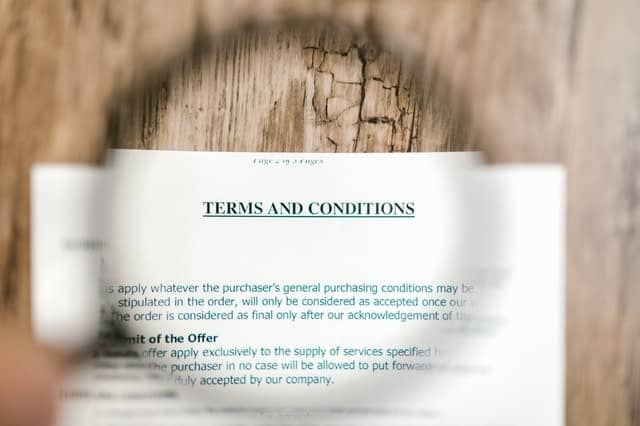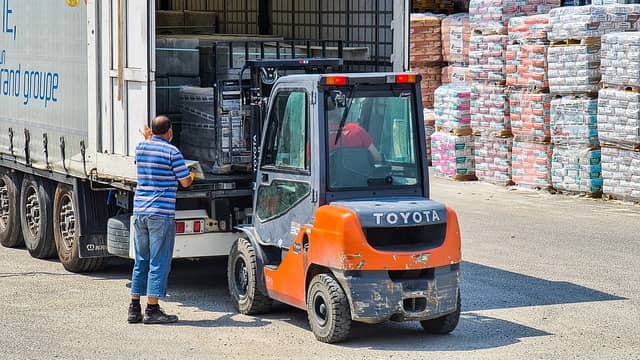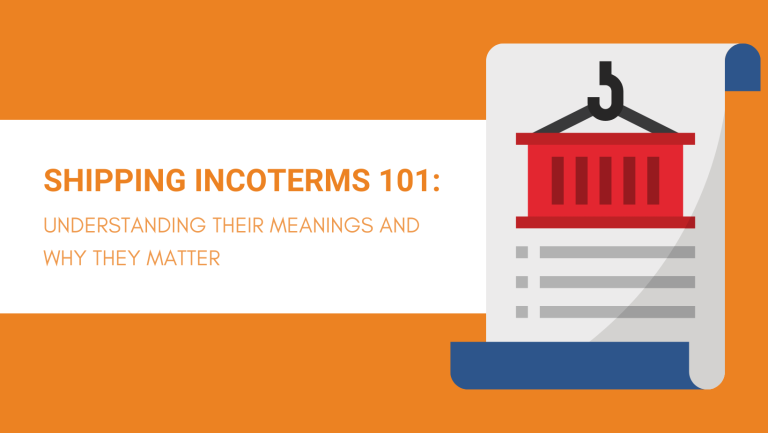Shipping is a concerted effort whenever you are sourcing goods from abroad. You and your supplier need to agree on costs, shipping methods, and other shipping provisions that work for both parties.
Shipping Incoterms were established to make such agreements easier to arrive at and universally accepted in international trade.
In today’s blog, we will define Shipping Incoterms in detail, the shipping concerns that they address, and share with you a list of Incoterms, and what they mean.
Read on.

Shipping Incoterms Definition
‘Incoterms’ is an acronym for International Commercial Trade Terms.
They are used in international trade as shared guidelines on how goods should be delivered from a seller to a buyer. They address who, between the seller and the buyer, is responsible for different costs, tasks, and risks during shipping.
Shipping Incoterms are published by the International Chamber of Commerce (ICC). They are accepted and adhered to by almost all countries in the world. The ICC reviews them every 10 years to keep them up to date with emerging trends and developments in international trade.
The most recent review was done by the ICC in 2020 and will be used until the next review in 2030.
What Factors Do Shipping Incoterms Address?

Right off the bat, it is important to mention that shipping Incoterms are not a sales contract. They are only used as part of the contract.
Let us explore this a bit further for clarity.
Take, for example, that you are sourcing wholesale baby clothes from China. You and your supplier will need to formulate a sales contract that outlines the prices, quantities, methods of payment, delivery schedules, and such details.
Shipping Incoterms will only come in when you need to define, in the contract, how the baby clothes will be delivered from the factory to your facility.
Incoterms address the following fundamental shipping concerns:
- Point of Delivery- this outlines where your goods are to be delivered and at what point the seller relinquishes their responsibility for the goods either to you or a shipping company.
- Transportation costs- this states who between you and your supplier is responsible for the transportation of the goods. It can also state whether any of the costs will be shared and how much of the transport each party will pay for in such a case.
- Customs clearances– this clarifies whether you or the seller will be responsible for clearing the goods through customs and who will handle details such as import and export fees, as well as the documentation for such clearances.
- Insurance- Incoterms on insurance define who is responsible for the cost of insurance while the goods are in transit.
A Complete List of Incoterms and their Definitions
In total, there are 11 shipping Incoterms used across the world.
The 7 listed below apply to all modes of cargo transport including air, road, rail, and ocean freight,
EXW (Ex Works or Ex-Warehouse)
It is the seller’s responsibility to pack the goods and have them ready for the buyer to collect. The buyer and seller should agree on when the goods should be collected.
The buyer is responsible for the collection of the goods, as well as any shipping, export, and import costs that may arise thereafter. The seller relinquishes all responsibility once the goods are packed and the buyer has been informed to collect them.
FCA (Free Carrier)
The seller is responsible for making the goods available at their premises or delivering the goods to a local destination that they agree upon with the seller. This destination could be a warehouse, a shipping terminal, or another form of transportation.
If the seller is to deliver the goods to another form of transport, they are responsible for loading the goods onto the buyer’s transport.

Further, if it is an international form of transport, the seller is also responsible for clearing the goods for export and paying the export charges.
At this point, responsibility for the goods transfers from the seller to the buyer. The buyer should also instruct their carrier to provide the seller with a bill of lading once the goods are loaded onto their transport.
CPT (Carriage Paid To)
In CPT, the seller is responsible for delivering the goods to an international destination that they have agreed upon with the buyer. They also:
- Pack and transport the goods to the international carrier
- Handle customs and export costs
- Pay for international shipping to the agreed location
However, while the seller pays for international transport, risk transfers to the buyer once the goods are handed over to the international carrier.
CIP (Carriage Insurance Paid To)
This shipping Incoterm addresses the same issues like those listed for CPT. The only difference is, in addition to paying for international carriage, CIP requires the seller to also pay for insurance coverage for the goods in transit.
It is now recommended that the insurance should cover about 110% of the value of the goods. The seller and buyer can, nonetheless, agree on a specific amount of coverage.
DAP (Delivery At Place)

In DAP, the seller is to deliver the goods at a location that they have agreed with the buyer. The seller bears all the costs of exporting and transporting the goods as well as the risks of transport until the goods arrive at the destination.
Once the seller delivers, all risk shifts to the buyer. The buyer is henceforth responsible for:
- The costs and processes of unloading the goods
- Paying all import duties, taxes, and customs clearance fees
DPU (Delivered at Place Unloaded)
The seller is to deliver the cargo at a location agreed upon with the buyer. They are to cater for all freight and exportation. Upon delivery, it is also the responsibility of the seller to unload the goods for the buyer. Responsibility shifts to the buyer once all goods are unloaded.
The buyer, on the other hand, is responsible for import duties, taxes, and customs clearance fees.
DDP (Delivery Duty Paid)

DDP stipulated that the seller is responsible for delivering the goods to a destination agreed upon with the seller. During this process, it is also their responsibility to:
- Deliver the goods to the port or shipping terminal
- Oversee the loading of the goods
- Pay for export fees and international shipping fees at the port of origin
- Clear the goods through customs when they arrive at the port of destination
- Pay import taxes and custom clearance fees
- Deliver the goods to the final location for them to be unloaded
The seller bears all the risks involved in all the above steps. The risk only shifts to the buyer once the goods are delivered to the final destination.
Note: The 4 shipping Incoterms listed below mostly apply to sea and inland waterway transport.
FAS (Free Alongside Ship)
As the name suggests, FAS is often used in regard to sea shipping. The seller is responsible for all charges and risks involved in transporting the goods from their premises to the loading bay of the ship.
After delivery, the risk, costs of loading the goods, and everything else, henceforth, becomes the responsibility of the buyer.
FOB (Free on Board)
The seller bears all risks and costs of transporting the goods from their premises to the shipping terminal. They are further responsible for loading the goods onto the ship as well as handling export clearances and costs.
Once the goods are on board, all risks and costs shift to the buyer.
CFR (Cost and Freight)
CFR requires the seller to bear all the risks and costs of:
- Transporting the goods to the international carrier
- Loading the goods
- Acquiring and paying for all export clearances
They are also further responsible for the cost of transporting the goods to the buyer’s port of destination. Responsibility only shifts to the buyer once the goods arrive at their port. of destination.
CIF (Cost, Insurance, and Freight)
The seller is responsible for fulfilling all the tasks and costs listed in CAF. The only difference is that in CIF, they are also responsible for the cost of insuring the goods while they are in transit.
Why Are Shipping Incoterms Important?
Shipping Incoterms provide numerous benefits to international trade. The benefits include:
Harmonized Terms of Trade

Shipping Incoterms provide a universal way for buyers and international sellers to handle their shipping transactions.
This is crucial because trade policies vary from country to country. It would, therefore, be difficult to agree on which regulations to follow each time a seller has to ship goods to a buyer in a different country.
Shipping Incoterms make it such that instead of reinventing new terms every time, sellers and buyers can simply negotiate and decide what Incoterms to incorporate in their sales contract.
Moreover, because shipping Incoterms are universal, they overcome the challenges of language barriers which is common when handling international contracts.
Clarity and Accountability

Each Incoterm outlines what the seller and the buyer are each responsible for. It also clearly indicates when risk transfers from one to another.
Subsequently, both parties are clear on what is expected of them and can hold each other accountable based on that. Better still, Incoterms are legally binding and which makes it easy for either party to seek redress if the other does not live up to their end of the bargain.
FAQs About Shipping Incoterms
Are Shipping Incoterms Mandatory?
No, they are not.
However, they are highly recommended for anyone transferring goods internationally. Most sellers, freight forwarders, and shipping companies also prefer to use them because Incoterms clearly define the roles and liabilities of all concerned parties.
How Do Buyers and Sellers Agree on which Shipping Incoterm to Use?
Most sellers usually have Incoterms that they normally work with based on what is ideal for them. This is, therefore, something worth considering as you try to find a manufacturer for your goods.
Nevertheless, these terms are not cast in stone. You too can present the seller with the terms that you prefer and negotiate to find a solution that works for all.
Further, once you agree on an Incoterm, it is advisable to ensure it is included in your sales contract so that it is contractually binding. Be sure to also change the Incoterms accordingly if you change any aspect of the terms of delivery.
Which Incoterms Are Best for Buyer?
The best Incoterms for buyers vary from one situation to another.
For example, one could easily assume that an Incoterm like DDP is the best for a buyer because the seller bears most of the risks and costs until the goods are at your doorstep.
However, DDP also presents challenges such as delays in delivery because the seller has to navigate import processes at your port which they may not be familiar with.
If you need a quick delivery this may not be ideal for you whereas it may be a great option for another buyer that does not mind the wait.
In more concise words, it is best to consider your timelines, budget, cargo safety requirements, and your seller’s capabilities then negotiate for shipping Intercoms that match your needs.
Alternatively, you could always consult a sourcing agent as they can advise on or handle all these issues for you.
Are Shipping Terms the Same as Shipping Incoterms?
Yes, they are. Shipping Incoterms is just a more formal word for shipping terms.
Where Can I Find a List of Updated Shipping Incoterms?
Shipping Incoterms and any updates about them are formally published by the International Chamber of Commerce. You can, therefore, find accurate and up-to-date Incoterms on the ICC website.
To Sum It Up
Without shipping Incoterms, the process of shipping goods across the world would likely be much harder and extremely chaotic. Thankfully most countries have now fully embraced them and you can easily access information about them so as to make the right decisions.
On the other hand, if you have a hard time identifying or negotiating suitable shipping terms you can always delegate such tasks to us at NicheSources. We are well-experienced in global shipping and order fulfillment involving different goods.
Subsequently, we can identify and advise you on a suitable shipping Incoterm for your needs. Feel free to send us a detailed request of your product sourcing and shipping needs and request a free quote.


Hugely helpful. Thanks